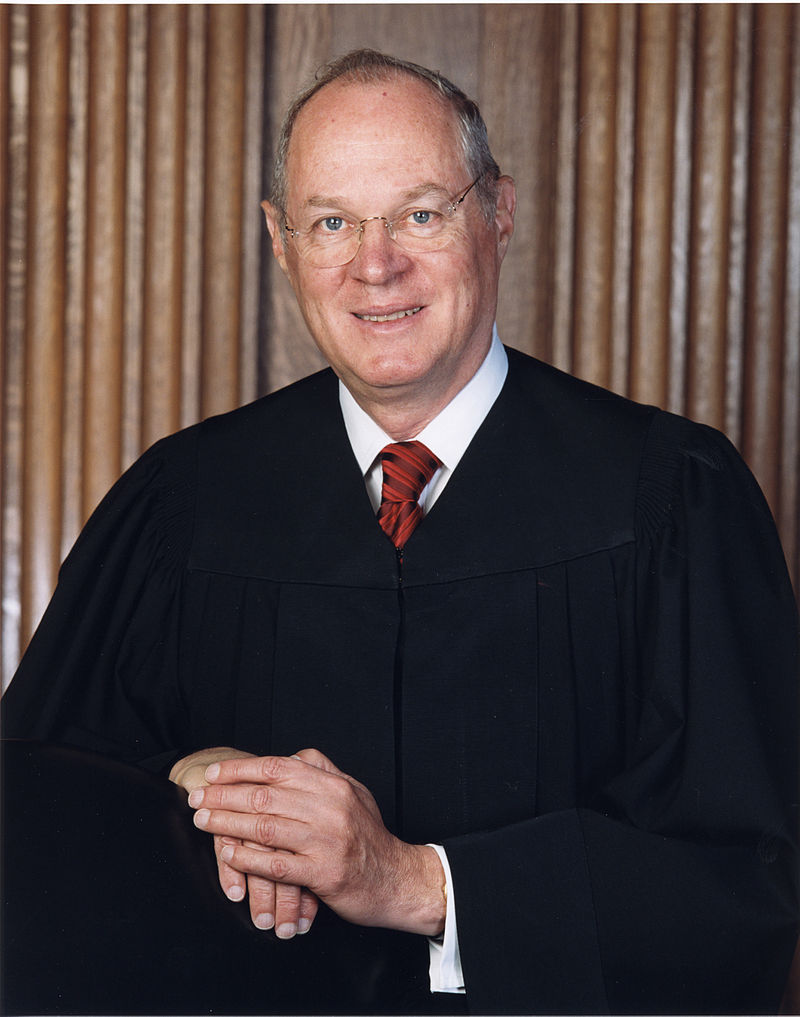American News
Kennedy seems conflicted in Supreme Court wedding cake case

Anthony Kennedy (Photo by Collection of the Supreme Court of the United States – Anthony Kennedy – The Oyez Project, Public Domain)
WASHINGTON — On a sharply divided Supreme Court, the justice in the middle seemed conflicted Tuesday in the court’s high-stakes consideration of a baker who refused to make a wedding cake for a same-sex couple in 2012.
The court’s fault lines were laid bare in a riveting argument that focused equally on baker Jack Phillips’ right to refuse to put his artistic talents to use in support of something in which he disagrees and the Colorado couple’s right to be treated like any other two people who wanted a cake to celebrate their marriage.
Both views were reflected in the questions and comments of Justice Anthony Kennedy, the author of all the court’s major gay-rights decisions and a fierce defender of free speech. The outcome of the case seemed to rest with the 81-year-old justice, who often finds himself with the decisive vote in cases that otherwise divide the court’s conservatives and liberals.
Phillips and the couple, Charlie Craig and David Mullins, were in the courtroom for arguments in the closely watched case that could affect other situations where there’s a clash between social conservatives’ claim of religious freedom and the LGBT community’s fight to preserve hard-won rights.
President Donald Trump’s administration is supporting Phillips in his argument that he can’t be forced to create a cake that violates his religious beliefs. It appears to be the first time the federal government has asked the justices to carve out an exception from an anti-discrimination law.
On the one hand, Kennedy pointed to photographers, florists, graphic designers and even jewelers who might likewise be able to refuse working on a same-sex wedding if the court rules for Phillips.
“It means that there’s basically an ability to boycott gay marriages,” said the author of the 2015 opinion extending same-sex marriage nationwide.
If you win, Kennedy asked Solicitor General Noel Francisco, could the baker put a sign in his window: “We do not bake cakes for gay weddings?”
When Francisco said that would be permissible, Kennedy said, “And you would not think that an affront to the gay community?”
Francisco replied that there “are dignity interests on the other side here, too.”
On the other hand, Kennedy criticized the Colorado Civil Rights Commission that found Phillips violated the state’s anti-discrimination law.
“It seems to me that the state in its position here has been neither tolerant nor respectful of Mr. Phillips’ religious beliefs,” Kennedy said. Craig and Mullins, he noted, could have been served by “other good bakery shops that were available” in the Denver suburbs.
Protesters on both sides filled the sidewalk in front of the court shortly before the start of the argument.
“We got Jack’s back,” Phillips’ supporters said. Backers of Craig and Mullins countered: “Love wins.”
Inside the packed courtroom, the liberal justices peppered Kristen Waggoner, Phillips’ lawyer, and Francisco with questions about how to draw a line to accommodate Phillips without eviscerating laws that require businesses that are open to the public to serve all customers.
Justices Ruth Bader Ginsburg and Elena Kagan ticked off other categories of people who are involved in weddings to ask if they, too, might be able to refuse a same-sex couple.
A hair stylist? A makeup artist?
No, Waggoner said, “because it is not speech.”
Kagan replied: “Some people might say that about cakes, you know?”
More generally, Justice Stephen Breyer said, “What is the line? That’s what everybody is trying to get to.”
When Colorado Solicitor General Frederick Yarger and the American Civil Liberties Union’s David Cole stood up to defend the commission’s ruling against Phillips, the conservative justices pounced.
Because same-sex marriage was not yet legal in Colorado in 2012, Justice Samuel Alito noted, Craig and Mullins could not have obtained a marriage license where they lived or gotten a local official to marry them. Yet Phillips supposedly “committed a grave wrong” when he refused to make them a cake, Alito said. That struck him as unfair, he said.
Chief Justice John Roberts pressed both Cole and Yarger on whether a Roman Catholic legal services agency that provides free aid would have to take up a case involving a same-sex couple despite the religious opposition to gay marriage.
Yes, Cole said, “if they’ve provided the same services to couples who are straight.”
Colorado native Neil Gorsuch, taking part in the most important gay rights case since he joined the Supreme Court in April, asked Cole whether a baker who made a cake shaped like a red cross to celebrate relief efforts would have to make the same cake for the Ku Klux Klan.
Cole said no because Colorado’s anti-discrimination law refers to race, sex and sexual orientation, among other categories, but does not protect KKK members.
One other possible result that emerged from the argument is that the justices could return the case to the Colorado commission for reconsideration if the court finds its first decision was tainted by the religious bias of a commissioner.
Kennedy described comments made by one of the seven Colorado commissioners in the case as hostile to religion.
Colorado is among only 21 states with statewide laws barring discrimination against gays in public accommodations.
The case, Masterpiece Cakeshop v. Colorado Civil Rights Commission, 16-111, will be decided by late June.





















